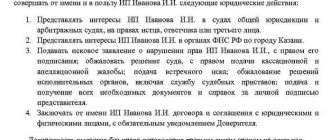When do you need a power of attorney from an organization to court?
Any legal dispute requires representation of the interests of its participants, whether individuals or legal entities.
Most organizations engage in contractual work every day, pay taxes, interact with clients, pay insurance premiums, and hire and fire workers. For each of these issues, a dispute may arise that will have to be resolved in court. Managers rarely participate in court hearings. They basically delegate authority to representatives.
In all cases of representation of a company’s interests in court by a lawyer, a power of attorney will be required, for example, if:
- you do not agree with the actions of your counterparties;
- you challenge the actions of government authorities, for example the tax authorities, regarding the assessment of taxes;
- a dispute has arisen with an employee, for example due to dismissal, non-payment of wages, or personnel error.
- clients went to court because they believe that the law has been violated and the organization is at fault;
- a dispute arose with the bailiffs;
- A car has been registered for the organization, and a fine has been received that you do not agree with.
There are a lot of situations when participation in court is required, and a professional lawyer will better protect the interests of the company.
Is an agreement with a lawyer necessarily a contract for the provision of services for a fee?
No, representation agreements can be completely different types of contracts.
An agreement to represent interests in court can, depending on the goals pursued by the parties, be concluded according to the model of paid services, a contract, or as a mixed agreement.
In this case, the agreement may imply both the one-time performance by the representative of certain actions, and the right of the represented to demand the completion of these actions within a certain period of time within the framework of the subscription agreement. The most obvious analogy is subscription agreements with fitness centers: the visitor pays for the opportunity to spend time in them for a certain period, while the number of actual visits does not affect the price in any way and does not lead to a refund.
Form and validity period of the power of attorney
ConsultantPlus has ready-made solutions, including those on who can represent the interests of a legal entity in arbitration proceedings in court and how to formalize powers. If you don't yet have access to K+, get it for free on a temporary basis. You can also get the current K+ price list.
A power of attorney to the court is drawn up in writing. Notarization is not required, even if the document is issued with the right of substitution.
Reliability is often used in large companies. For example, when a power of attorney is issued to the head of the legal department, and he, in turn, delegates interests to employees specializing in specialized matters - road accidents, taxes, etc.
The duration of the power of attorney can be any, but you need to proceed from the approximate duration of the trial. If the representative will participate in several cases, it is advisable to issue a power of attorney for a longer period.
Important! Even organizations that delegate powers of representation in court to in-house lawyers, as a rule, issue powers of attorney for no more than a year. This is due to the fact that an employee may quit, go on maternity leave, get sick, and the power of attorney will have to be revoked.
If the power of attorney has expired, you can always issue the same one with a new date.
The validity period is calculated from the date of issue of the document, which is stated in it. If it is not registered, the power of attorney will be void. She simply won't be accepted in court.
Writing to participate in general meetings to vote
Such a document must be drawn up in accordance with the requirements specified in Part 2 of Article 48 of the RF Housing Code . He is able to give a certain person the authority to participate in the general meeting of the HOA in order, for example, to vote at it.
The paper must contain the passport details of this person, information about the place of residence, full name or name of the organization if the paper is provided to a legal entity.
In addition, when drawing up such a paper, you should pay attention to Article 185 of the Civil Code of the Russian Federation. If you believe it, then such a power of attorney must be certified by an organization engaged in housing and maintenance activities. The latter must be located at the place of residence of the principal.
Reference! The document can also be certified by the body in which the person granting the power of attorney works or is trained.
If the principal is undergoing treatment in a certain institution, then the paper can be certified by it. Of course, you can get by with an ordinary certificate from a notary, but it’s worth remembering that it won’t be cheap.
Sample of a judicial power of attorney from a legal entity
A sample of a judicial power of attorney can be downloaded in the “Documents and Forms” section at the beginning of the article.
We recommend that you include the following information in the document:
- Name. Simply write: Power of attorney.
- Place and date of issue. For example: Moscow, April twentieth, one thousand nine hundred and twenty-three. The date is required, don't forget about it.
- Information about the organization - name, legal form, TIN, OGRN, registration address, director. For example: Romashka LLC, INN ______, OGRN, _______, registered at the address: Moscow, st. Sevastopolskaya, 2, represented by General Director Ivan Ivanovich Ivanov, acting on the basis of the charter, authorizes...
- Representative information. If this is an individual, then full name, registration address, date of birth, passport details. If this is an organization, then TIN, OGRN, name.
- Information about what powers are being transferred. For example: Represent the organization in arbitration courts, courts of general jurisdiction, before magistrates, and perform all procedural actions provided for by law.
- Duration of the power of attorney. For example: A power of attorney was issued for a period of one year.
- Transfer data. For example: A power of attorney was issued without the right to delegate to other persons.
- Signature of the head of the organization.
- Organizational stamp, if available.
Who can authorize a representative and sign a document?
If the HOA meeting needs to delegate certain powers to someone, this can be done by a member of the board, for example the chairman of the HOA. However, it is worth noting that it is also impossible to act without the knowledge of the meeting or board .
The transfer of authority must be carefully discussed and approved.
In this case, the person granting the power of attorney must be an authorized representative of the HOA and have the right to act without presenting certain documents.
Such people are clearly stated in paragraph 1 of Article 53 of the Civil Code of the Russian Federation.
However, such a document can be signed by :
- executive body of the HOA;
- another person designated by law or the charter of the partnership.
Attention. All this is clearly indicated in paragraph 4 of Article 185.1 of the Civil Code of the Russian Federation. If you believe her, then the people mentioned can certify the document with their signature.
In addition, the paper must be certified by a seal. It is worth noting that such a requirement is not contained in the Civil Code of the Russian Federation, but it can be seen, for example, in Article 53 of the Civil Procedure Code of the Russian Federation and Article 61 of the Arbitration Procedure Code of the Russian Federation.
Nuances of issuing a power of attorney for the court from a legal entity
Most of the nuances are related to representation in specific cases. The fact is that procedural legislation obliges to prescribe specific powers for certain actions.
For example, if the power of attorney does not indicate the right of the representative to file complaints against decisions in cases of administrative violations, the complaint will most likely be returned to the representative. The powers can be found in specific procedural articles, for example Part 2 of Art. 56 CAS RF, art. 54 Code of Civil Procedure of the Russian Federation, Part 2, Art. 62 Arbitration Procedure Code of the Russian Federation.
Here are examples of permissions you may need to specify:
- Sign administrative claims and objections to an administrative claim, submit them to the court, sign and submit to magistrates applications for the issuance of court orders.
- Sign and submit counter administrative claims.
- Conclude agreements on reconciliation of the parties.
- Refuse in whole or in part from the administrative claim.
- Change the subject and basis of the claim.
- Appeal court decisions.
- Receive awarded funds.
- Present writs of execution for execution.
Another nuance is printing. If the charter states that there is a seal, but the power of attorney does not have one, then the representative may not be allowed to participate in the case.
If the representative is on the staff of the organization, indicate this in the power of attorney and write down the position (clause 12 of the resolution of the Plenum of the Supreme Arbitration Court of the Russian Federation dated December 9, 2002 No. 11).
When you transfer a power of attorney with the right to reassign, write down the possibility of further reassignment, if you want it to exist.
What might it be needed for?
The document in question can be used in different ways. For example, the general meeting of the HOA can delegate his job responsibilities to the manager and set them out in a similar document. This happens in a certain situation, for example, if a person holding the above-mentioned position represents the interests of the HOA in a third-party organization.
Any government or local government body can act as such an organization. If such a situation arises, then the power of attorney specifies all the powers of the manager listed in the job description and set out in the agreement concluded between the partnership and the manager.
It is worth noting that when drawing up a power of attorney for such a case, you should adhere to the rules set out in Article 10 of the Labor Code of the Russian Federation . In addition, such a document must be certified by a notary. If this is not done, the paper will not have legal force.
Where is it provided?
Such a power of attorney is presented by the official representative at the place of request . If the document is drawn up to receive a pension, it must be presented at the point of issue, for example, at the post office. The paper is also provided to the court, Pension Fund or other organization, provided that this is indicated in the text of the power of attorney.
Other powers of attorney may also be subject to certification, for example, for the sale of an apartment, which we wrote about in a separate article.
Certifying a power of attorney at the place of official employment is not a complicated process; it is only important to draw up the document itself correctly. The advantage of this method of registration over a notary one is the absence of payment, as well as saving time. There is no need to make an appointment, go somewhere special, or sit in queues. Therefore, if provided for by current legislation, a power of attorney can be drawn up and certified at the place of work.
What other documents does a lawyer need?
In order to competently represent the client’s interests, a lawyer needs documents related to the case. The exact list depends on the specifics of the case. A power of attorney issued in the name of a lawyer at a notary office, as well as an agreement for the provision of services and representation of interests, are mandatory.
When drawing up a contract, it is important to indicate in which area of law the lawyer will represent the interests of his client. For example, in the field of constitutional, family, labor or administrative.
And in the “body” of the power of attorney, it is necessary to specifically describe the powers being transferred. If the lawyer deviates from them, the client will be able to make a claim.







